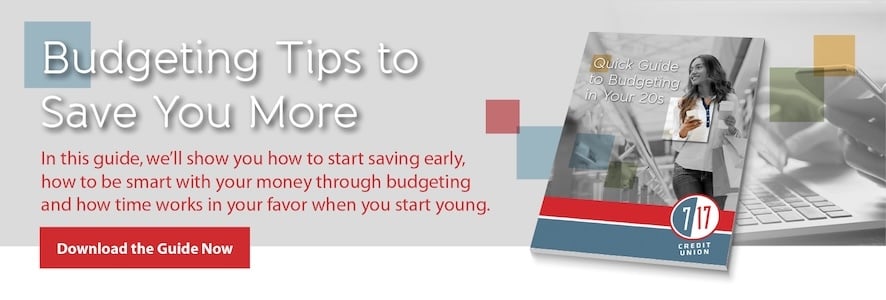- 7 17 Staff
Budgeting for Life: Strategies To Manage the Rising Cost of Living

Budgeting is an important skill to have, especially as the cost of living increases. Having a solid budget and emergency fund will give you the tools you need to prepare for the unexpected and avoid running into financial trouble or debt. Let’s take a look at how you can navigate your finances as your cost of living fluctuates.
Why Should You Have a Realistic Budget?
A realistic budget helps you live within your means. If you’re just estimating what your living expenses are each month and don’t have a detailed budget, there’s a high likelihood that you could underestimate how much your living expenses add up to. If this happens, then you could find yourself either spread too thin with what you have left or missing an important payment, which can result in your credit score taking a hit.
A realistic budget requires reworking every time your finances change in some way, whether that’s an increase or decrease in income or a change in your expenses. Even if nothing changes, you should make it a goal to look at your budget a few times a year to see if there are any expenses you could cut back on and to account for any changes in your cost of living.
The key to a realistic budget is to include everything you’re spending your money on, right down to all those takeout coffees, new books, digital subscriptions and the occasional spa day. Without including all of these items, you may not have the clearest picture of what you’re spending each month.
What if You Can’t Cover Your Cost of Living?
The hard part of adjusting your budget to address the rising cost of living is realizing that your current income may not be cutting it. Especially if you’re living in an expensive city or have an entry-level job, it can feel like you’re pinching pennies a little too much.
Some creative ways to make your budget work are getting a side job and seeking a salary increase. Let’s take a look at each of these in more detail.
Increase Your Income With a Side Job
Trimming your expenses is essential to making your budget work for you, but you may also want to consider increasing your income in your free time with a side gig. And the good news is there are plenty of options available depending on your skills and interests. For example, you could consider looking into freelance work, driving for a ride-sharing company or delivering food.
Ask for a Salary Increase
If you’re having trouble covering your living expenses, you may want to consider asking for a raise. However, there are a few things to consider before doing this. For example, if your manager is under a lot of stress or the company isn’t doing well, it may not be the time to ask for a raise.
How To Cut Expenses To Fit Your Budget
A budget and cost of living look a little different for everyone. Here are some ways to cut down on your expenses in every major category so you can choose what works best for your unique situation.
Housing Expenses
- Get a roommate.
- Move to a less expensive location.
- Reduce utility costs by being mindful of water and electricity usage.
Groceries
- Plan your meals to stretch ingredients and your budget.
- Purchase store-brand items.
- Cut back on purchasing takeout and coffee.
Transportation
- Use public transportation.
- Purchase a used car instead of a new one.
- Carpool to work.
Discretionary
- Shop at consignment stores.
- Use coupons.
- Downgrade your cellphone plan.
How To Build an Emergency Fund
The purpose of an emergency fund is to help you get through unexpected expenses, such as a medical bill or job loss, to give you some cushion and avoid financial trouble. Your emergency fund should be tailored to your unique circumstances, so while the general guideline is to have 3-6 months’ worth of expenses in the fund, it’s just that: a general guideline to give you an idea of where to get started.
When you start contributing to your emergency fund, start small — especially if it’s hard to stick to your goal at first. It may help to treat your emergency fund like a bill and contribute to it at the same time you pay your monthly bills.
Remember to frequently evaluate your emergency fund. (It’s a good idea to do this when you’re reevaluating your budget.) As your cost of living changes, your emergency fund goal will also change. By periodically reviewing your emergency fund, you can ensure that you’ll have financial stability as your expenses and income fluctuate.
Learn To Budget
Part of adulthood is becoming proficient in the art of budgeting, which can seem overwhelming at first. But like most things, practice makes perfect. Get started today with our free resource, “Budgeting for Beginners: A Quick Guide for Budgeting in Your Twenties.”
